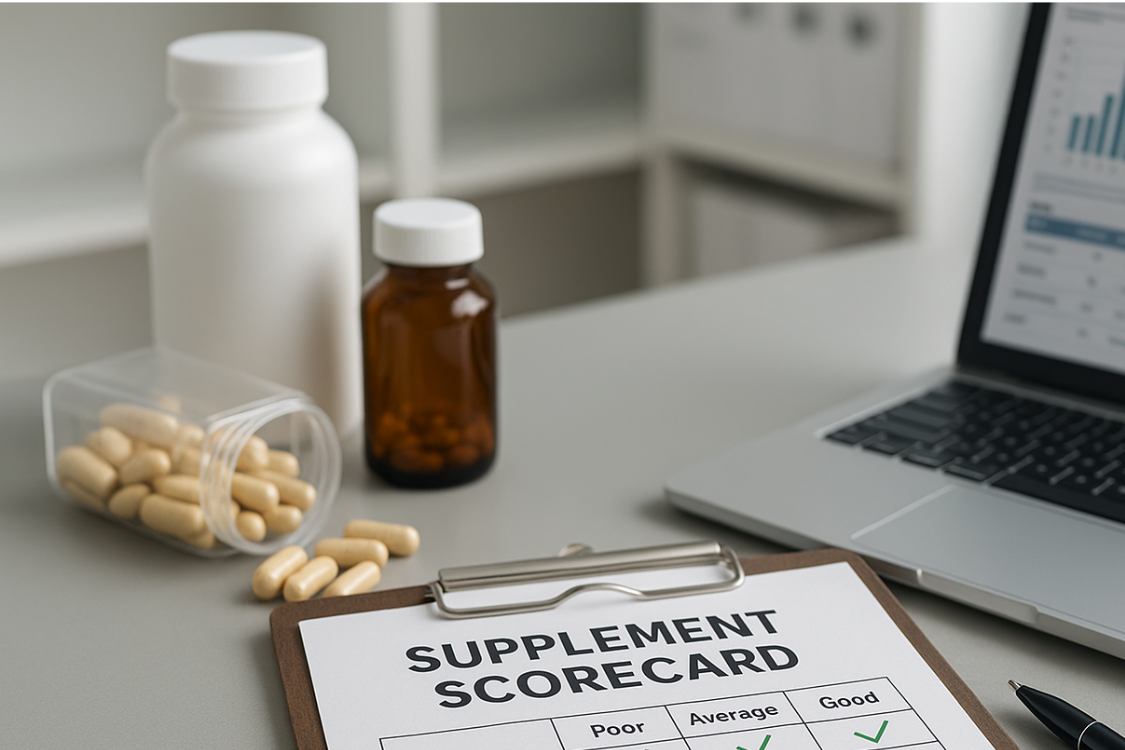Can a single mistake in choosing a supplement manufacturer cost your business its reputation? In a market crowded with dietary supplements and growing concerns around product safety, quality control, and regulatory compliance, the answer is yes. To help businesses avoid these risks, the 10,000-point supplement manufacturer scorecard was created.
One misstep, such as partnering with a manufacturer that cuts corners on testing or misrepresents label claims, can result in costly recalls, Food and Drug Administration (FDA) warnings, or serious harm to consumers. This tool provides a structured way to evaluate potential partners based on measurable criteria. It supports informed decision-making and helps brands align with manufacturers who meet high standards for quality control and regulatory compliance in dietary supplement health and safety.
What Is a Supplement Manufacturer Scorecard?
A supplement manufacturer scorecard is a detailed evaluation tool that helps businesses compare and select qualified partners in the supplement industry. It’s designed to reduce risk and ensure product safety before entering a manufacturing agreement.
With so many nutritional products on the market, it’s difficult to separate reliable manufacturers from those that may cut corners on good manufacturing practices or ignore FDA regulations. The scorecard solves that by giving a structured method to assess critical factors like quality control measures, label claims, and production capacity. Businesses can use this approach to make informed decisions, improve supply chain visibility, and stay compliant with rules set by the FDA, Federal Trade Commission, and Dietary Supplement Health and Education Act of 1994 (DSHEA).

Breaking Down the 10,000-Point Scorecard
The 10,000-point scorecard is broken into three weighted categories that examine the business, the products, and the transparency of the manufacturer. Each section captures specific traits that impact product safety, performance, and business success.
The system was developed to help brands meet rising expectations in the dietary supplement health market. Using it supports rigorous monitoring for product quality and compliance with official policy from the US government, which can help brands reduce risk, especially when entering regulated spaces like military medicine or health and military performance programs.
Business Profile (4,000 Points)
Trust starts with the foundation of the business. This category checks how stable, legal, and respected a manufacturer is in the supplement industry.
Company Stability and Experience
A manufacturer’s track record shows how well they handle market shifts, supply chain issues, and changes in FDA regulations. Long-standing businesses with consistent growth and experience across vitamins, plant extracts, and minerals earn more points. Stability helps ensure a steady supply of high-quality nutritional products that meet demand without delays.
Ownership Structure and Legal Standing
A strong manufacturer should have transparent ownership, clear business registration, and no major legal issues. Public lawsuits or suspicious partnerships raise red flags. Use sources like business registries, the Jackson Foundation, or the Uniformed Services University if working in sectors tied to military performance or operation to supplement safety.
Reputation Through Client and Employee Feedback
Feedback from long-term clients and staff gives insight into day-to-day operations. A manufacturer with high retention, good culture, and public praise on platforms like Trustpilot or Glassdoor is more likely to honor timelines, follow current good manufacturing practices, and uphold quality standards throughout the production process.
Product-Related Factors (5,500 Points)
This is the most important section. Everything from vitamin D capsules to complex plant extracts depends on strong production practices. High scores here reflect the manufacturer’s ability to deliver products that are consistent with what’s on the product label and adhere to established quality standards.
Production Capabilities and Capacity
A manufacturer must keep up with current production needs and have the capacity to scale as business demand grows. If they can handle capsules, powders, gummies, and liquid chromatography testing, it shows adaptability. Larger facilities with a wide range of foods and nutrients offer more flexibility for product launches and seasonal demand.
Quality Control and Testing Practices
Product efficacy, purity, and potency rely on strong quality control measures. Look for clear protocols, third-party testing, and Certificates of Analysis. Testing methods like mass spectrometry or liquid chromatography add confidence that each batch meets set quality standards and avoids risky contamination.
Certifications and Manufacturing Standards
Key certifications include FDA registration, cGMP (current Good Manufacturing Practices), and USDA Organic. These confirm the facility is inspected, compliant, and up to date. Audits from these relevant bodies help verify the status of brands in niche health sectors.
Pricing Transparency and Minimum Order Quantities (MOQs)
Clear pricing helps avoid surprise charges. If a manufacturer is upfront about costs and offers low or flexible MOQs, it supports small businesses entering the dietary supplement space. Hidden fees and rigid contracts reduce flexibility and increase long-term risk.
Lead Times and Production Scheduling
On-time delivery is non-negotiable. Missed lead times create stockouts or missed launches. A reliable manufacturer will offer honest production windows and accurate delivery estimates that match real capacity.
Support Services and Logistics
Some manufacturers go beyond production by offering packaging, labeling, and fulfillment. If they support direct shipping or Amazon FBA prep, this can lower your logistics burden. These added services increase your operating efficiency and improve your product label consistency.
Business Credibility and Transparency (500 Points)
This section focuses on how open and ethical a manufacturer is. Transparency supports long-term partnerships and reduces uncertainty during product development.
Certifications and Verifiable Documentation
A trustworthy manufacturer should be able to show all certifications, testing reports, and registrations. Delays in sharing documents may signal disorganization or noncompliance. Fast responses signal maturity and reliability.
Willingness to Share Operational Processes
A qualified manufacturer won’t hide how they handle dietary supplements, from sourcing minerals to applying label claims. They should welcome questions about monitoring, traceability, and compliance. Clarity during early conversations helps you avoid problems down the line.
Accessibility for Virtual or On-Site Tours
Offering facility tours, whether in person or virtual, shows pride and openness. It gives a first-hand look at how safety, manufacturing, and quality assurance come together. This is especially important for businesses involved in operating supplement safety scorecard programs or sectors tied to official policy and research.

Non-Negotiable vs. Negotiable Criteria
Every supplement business should have clear minimum standards when evaluating a manufacturer. These non-negotiables include legal compliance, FDA registration, and adherence to good manufacturing practices.
Negotiable features may include packaging styles, lead time flexibility, or access to in-house fulfillment. These can improve workflow but aren’t deal-breakers. Knowing the difference helps keep your focus on essential requirements that ensure product safety.
Assigning Scores to Manufacturers
Scores should reflect how well each manufacturer meets your priorities. A full score means they meet or exceed expectations. A partial score indicates some gaps. Zero points usually signal a risk to product safety, timeline, or compliance.
Always back up your scoring with documents, reviews, or data. Avoid relying on assertions expressed during sales calls. Use hard evidence like test results, certificates, or public audits to confirm claims and eliminate risky partnerships.
Interpreting the Total Score
The total score from your supplement manufacturer’s scorecard gives a clear picture of how well each manufacturer aligns with your business needs. This scoring method allows you to evaluate potential partners based on product quality, regulatory compliance, and transparency. Here’s how to interpret the results:
- Excellent fit: 8,500–10,000 points
These manufacturers meet the highest standards in product safety, good manufacturing practices, and operational reliability. - Good fit: 6,500–8,499 points
These partners meet most essential requirements and may still be a strong option depending on your brand’s priorities. - Poor fit: Below 6,500 points
These manufacturers present higher risks in areas like testing, label claims, or documentation, and may not meet quality expectations.
A lower score doesn’t always mean rejection, but it should prompt a closer look at what trade-offs you’re willing to accept. Use the scorecard to make informed, balanced decisions that support long-term business growth.

Creating a Comparative Analysis Table
Comparing scores side-by-side makes your choice easier. You can organize manufacturers by business strength, product quality, or transparency.
Here’s an example table structure:
| Manufacturer | Business Profile | Product Quality | Transparency | Total Score |
|---|---|---|---|---|
| MFG A | 3,800 | 5,200 | 500 | 9,500 |
| MFG B | 3,200 | 4,900 | 300 | 8,400 |
Tables like this bring clarity during final selection and help avoid emotional decisions.
Implementing the Scorecard in Your Selection Process
Using the supplement manufacturer scorecard effectively starts with a focused, step-by-step approach. This helps you stay organized while evaluating dietary supplement manufacturers based on product safety, label claims, and regulatory compliance. Here’s how to put the scorecard into action:
- Begin with research and pre-qualification
Use websites, public records, and client feedback to identify manufacturers with strong reputations, quality control measures, and compliance with FDA regulations. - Request documentation and verify key details
Ask for certifications, test results, and examples of product labels. Look for proof of current good manufacturing practices and testing methods like mass spectrometry. - Conduct calls or schedule facility tours
Direct conversations and on-site or virtual walkthroughs allow you to assess the environment, confirm manufacturing practices, and observe safety protocols. - Evaluate using the full scorecard
Apply the scoring criteria to each manufacturer based on real data. Pay close attention to red flags around product quality, pricing structure, and logistics support. - Contact references and ask targeted questions
Speak with current or past clients about their experience. Ask about lead times, support services, and how the manufacturer handled any issues or adverse reactions.
Following this structured process will help you make informed decisions and choose a manufacturing partner that supports your business and brand vision.

Common Mistakes to Avoid
Even with a strong supplement manufacturer scorecard in place, some mistakes can still put your brand at risk. These errors often lead to poor product quality or violations of FDA regulations. Here are key missteps to watch for:
- Skipping certification and test result checks
Failing to verify lab reports, safety rating scorecards, or compliance with good manufacturing practices can increase the risk of partnering with a manufacturer that may produce products that are unsafe or non-compliant dietary supplements. - Trusting claims without documentation
Relying on marketing language or verbal assurances without requesting evidence puts your business at risk. Always ask for proof related to product quality, label claims, and testing methods like liquid chromatography or mass spectrometry. - Overlooking facility tours
A tour, whether virtual or on-site, reveals details about the manufacturer’s operations, hygiene standards, and quality control measures that you can’t confirm through email or a website alone.
Each of these mistakes can be avoided by following a structured, evidence-based approach. Staying thorough and asking the right questions ensures product safety and builds trust with your customers.
Making the Right Choice for Your Brand
Choosing the right supplement manufacturer is a critical step in protecting your brand and ensuring regulatory compliance. One weak link in the supply chain can lead to compliance issues, safety risks, or damage to your reputation.
The 10,000-point supplement manufacturer scorecard offers a practical way to evaluate potential partners using clear, measurable data. Instead of relying on vague promises or polished sales pitches, you can assess key areas like product safety, quality control, and manufacturing standards.
This approach helps you focus on what matters most: consistent quality, regulatory compliance, and reliable operations. In an industry shaped by tight regulations and increasing consumer expectations, structure and evidence are not optional. They are necessary.
A strong manufacturing partner does more than deliver products. It supports the future of your business.
Frequently Asked Questions
What certifications should I look for in a supplement manufacturer?
Look for FDA registration, cGMP compliance, NSF certification, and any third-party audits that verify quality standards.
How do I verify a manufacturer’s compliance with industry standards?
Request certificates, audit reports, and documented quality control procedures to confirm adherence to regulatory guidelines.
What are common red flags when evaluating a supplement manufacturer?
Lack of documentation, vague answers about testing, hidden fees, or poor online reviews are signs to proceed with caution.
How important is a facility tour in the evaluation process?
Facility tours offer direct insight into cleanliness, processes, and transparency, which are key indicators of manufacturing quality.
Can I negotiate terms with a manufacturer who doesn’t meet all criteria?
Yes, but only if they meet your non-negotiables around product safety, compliance, and quality assurance.
References
- Dietary Supplement Health and Education Act of 1994, Public Law 103-417, 103rd Congress. (1994). Office of Dietary Supplements, National Institutes of Health. https://ods.od.nih.gov/About/DSHEA_Wording.aspx
- U.S. Food and Drug Administration. (n.d.-a). Current good manufacturing practice (CGMP) regulations. https://www.fda.gov/drugs/pharmaceutical-quality-resources/current-good-manufacturing-practice-cgmp-regulations
- U.S. Food and Drug Administration. (n.d.-b). Online registration of food facilities. https://www.fda.gov/food/registration-food-facilities-and-other-submissions/online-registration-food-facilities
- van Breemen R. B. (2020). Role of Mass Spectrometry in Establishing Safety and Efficacy of Botanical Dietary Supplements. Clinical mass spectrometry (Del Mar, Calif.), 15, 25–28. https://doi.org/10.1016/j.clinms.2019.12.001



